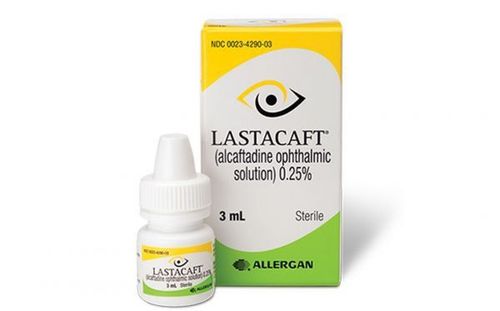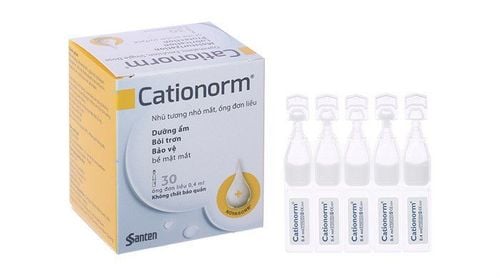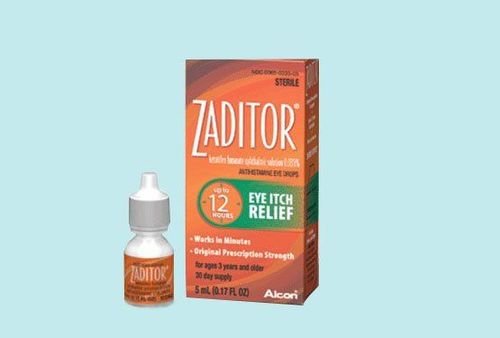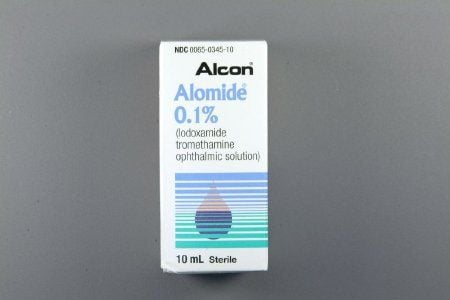This is an automatically translated article.
The article was professionally consulted by Specialist Doctor I Nguyen Thi Bich Nhi - Ophthalmologist - General Surgery Department - Vinmec Nha Trang International General Hospital.Eye allergy is one of the common conditions encountered in people who are prone to allergies. Although this disease can be easily cured, it still has the potential to cause serious eye complications that greatly affect the patient's vision.
1. What is an eye allergy?
Allergic conjunctivitis, also known as allergic conjunctivitis, is one of the common allergic conditions, usually caused by allergens in the eyes, then the body will produce histamine to fight factors responsible for this allergic reaction. However, the immune system's response can go awry and lead to immune reactions to dangerous substances, triggering allergic attacks. When an allergic reaction occurs, the eyes become swollen, red, itchy, burning and watery.Most cases of eye allergies are often accompanied by allergies in the nose (manifested such as stuffy nose, itchy nose or sneezing). However, this allergy is only temporary and it can happen during a certain season of the year. For eye allergies, the main allergens can come from the outside environment, when the eyes come into contact with objects such as perfume, pollen, animal dander, dust, smoke or foods. May cause eye irritation.
2. Signs and symptoms of eye allergies
Eye allergies can occur at the same time as other allergic conditions, including nasal allergies or eczema (skin allergies). When an allergic reaction occurs, the patient will experience the following specific symptoms:Blurred eyes Redness inside the whites of the eyes The eyes are itchy, there is a burning sensation
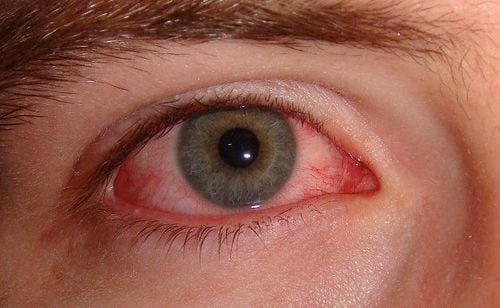
Tròng trắng của mắt xuất hiện đỏ
3. Are eye allergies dangerous?
Eye allergy is a relatively dangerous allergic condition, it can lead to some serious eye damage if not treated promptly:Keratitis : occurs due to factors such as bacterial infection , infection, toxin, infection with chickenpox, herpes or shingles viruses. Keratitis often leads to non-purulent inflammatory reactions, necrosis, impaired vision, even blindness if not treated early. Allergic conjunctivitis: This is one of the most common eye conditions. When suffering from allergic conjunctivitis, the patient often presents with specific symptoms such as watery eyes, itchy eyes, a lot of rust and often has a clear color, sometimes sticky, thick or liquid. When the disease is more advanced, it will cause conditions such as eyelid twitching, edema or sensitivity to light.
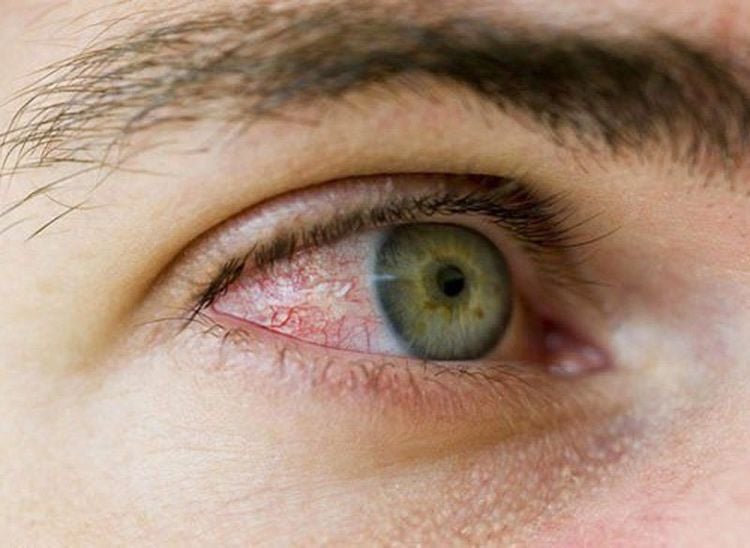
Tình trạng viêm kết mạc dị ứng
4. What should I do when I have an eye allergy?
First, you need to distinguish eye allergies from other eye conditions. Patients also need to localize the factors that can cause this allergic condition.Once an eye allergy has been identified, the allergens present in the eye need to be removed quickly. In addition, patients should absolutely not rub their eyes with their hands because this will inadvertently trigger mast cells to release more, making the disease worse.
You can also relieve symptoms such as itchy, swollen eyelids and help stabilize immune cell membranes with cold therapy. In case the allergy symptoms do not improve, you should see a doctor to be treated with other more effective methods.

Người bệnh không nên dụi tay vào mắt
In case of using eye drops, there is an allergic reaction, the patient must stop the drug immediately and bring the medicine to a medical facility for guidance and choice of changing other more suitable drugs.
5. Eye allergy treatment
Here are some effective methods commonly used to treat cases of eye allergies:Oral antihistamines: effective treatment for symptoms such as itchy, burning eyes. However, this medicine can cause some unwanted side effects, such as dry eyes or making eye allergies worse. Artificial tears: Using artificial tears to remove allergens will provide temporary relief of symptoms such as dry eyes and moisture in the eyes. You can buy these medicines at the pharmacy and use them regularly to get the best results. Decongestants: Decongestants are used to treat the symptoms of red eyes caused by allergies to allergens.
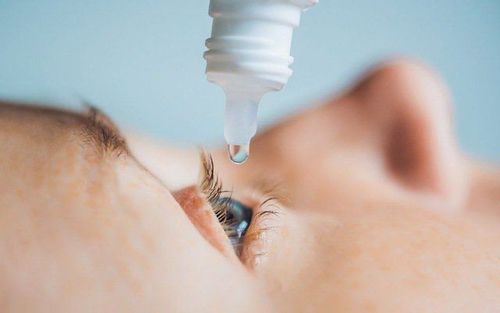
Dùng thuốc nhỏ mắt điều trị bệnh
6. Ways to prevent eye allergies
To effectively prevent eye allergies, you should follow the following ways:Limit exposure to allergens, such as pollen, cat and dog hair, dust, smoke,... Enter In spring or summer, vegetation including trees, weeds and pollens often flourish. Therefore, when indoors, you should close the windows facing the garden and turn on the air conditioner in the room. If you have to be outdoors, you should wear eyeglasses to prevent allergens from getting into your eyes. Mold, dirt, and pet dander are all top triggers for eye allergies. Therefore, it is very important to keep the house and bathroom clean. High humidity will create favorable conditions for pathogenic molds to grow, so when indoors, you should try to maintain a humidity of about 30%-50%. In addition, after contact with animals, you should wash your hands thoroughly with hand sanitizer to remove hair and bacteria.
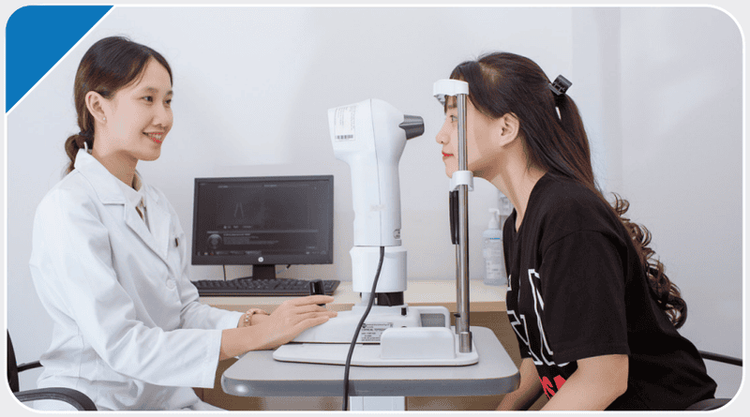
Kiểm tra mắt định kỳ 6 tháng/lần tại các cơ sở y tế uy tín giúp phát hiện sớm bệnh lý mắt
Patients can visit and treat eye allergies and many other diseases at Vinmec International General Hospital. We have a team of highly qualified and experienced doctors and a system of modern facilities and equipment used for many eye surgeries that will bring satisfaction to customers.
Doctor CKI Nguyen Thi Bich Nhi has nearly 10 years of experience in the eye field. Treatment of medical eye diseases as well as eye surgery such as: pterygium, entropion, milia, glaucoma and cataract surgery by Phaco method. Besides, it also treats diabetic retinopathy by intraocular Anti-VEGF injection and ophthalmic surgery. Currently, the doctor is an Eye Doctor in the Department of Medical Examination - Internal Medicine, Vinmec Nha Trang International General Hospital.
Customers can directly go to Vinmec Health System nationwide for medical examination and treatment or contact the hotline HERE for support.
Reference source: webmd.com




